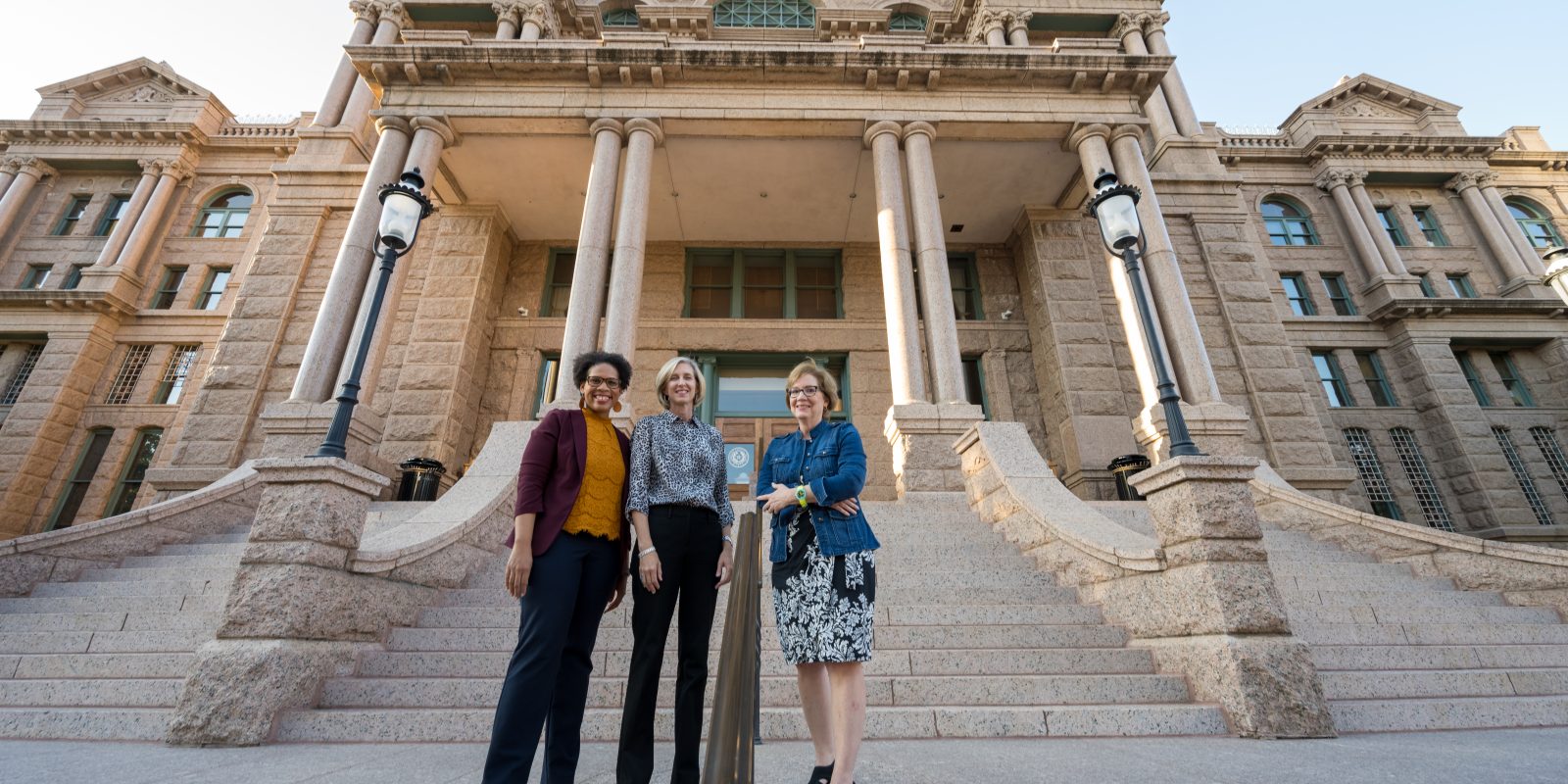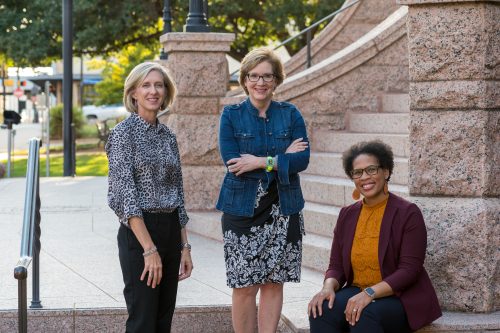
From left, Ashley E. English, Julie O’Neil and Jacqueline Lambiase are studying ways to improve communication between city government officials and Fort Worth residents. Photo by Leo Wesson
Learning to Listen
TCU professors seek ways to improve communication between civic leaders and Black constituents.
On Oct. 12, 2019, Atatiana Jefferson was playing video games with her 8-year-old nephew at her family home in Fort Worth’s Hillside Morningside neighborhood.
She was unaware that a concerned neighbor had called the Fort Worth Police Department, which sent officers to investigate the report that a door to her house was open.
Thinking she heard a prowler, the 28-year-old Black woman grabbed her handgun and peered out the window. Bodycam footage revealed that Aaron Dean, a white officer who had graduated from the police academy 18 months earlier, shot Jefferson once through the glass. In December 2022, Dean was convicted of manslaughter and sentenced to almost 12 years in prison.
The tragedy grabbed worldwide headlines and sparked protests throughout Fort Worth. Police in riot gear locked down City Hall. As demonstrators marched through the streets, protesters decried police violence.
Many members of the Black community said they felt unheard by city officials, which amplified their anger, frustration and fear.

“Listening can save someone’s life,” says Ashley E. English, right. “And maybe listening can also heal and affirm those who have not felt heard for so long.” Photo by Leo Wesson
“The truth is that many of us are tired,” Pastor Bryan Carter of the Concord Church in Dallas, where Jefferson’s funeral was held, told the Fort Worth Star-Telegram. “We are tired of talking to our children about police, tired of crying mothers, tired of funerals, tired of checking the box, tired of hoping the jury will come back with a just verdict.”
A few months after Jefferson’s killing, Julie O’Neil, associate dean for graduate studies and administration in the Bob Schieffer College of Communication and professor of strategic communication, began working with colleagues Ashley E. English and Jacqueline Lambiase to find ways to improve communication among civic leaders, the police and marginalized residents.
“Good public relations is about building relationships, listening, dialoguing, engaging,” O’Neil said. “We thought it would be a unique contribution to look at listening and city government and Black communities.”
Supported by a grant from the Arthur W. Page Center for Integrity in Public Communication at the Donald P. Bellisario College of Communications at Pennsylvania State University, the three scholars are studying civic listening in Fort Worth and around the nation.
They spoke over Zoom with 25 Fort Worth residents, including community activists, pastors, retirees, attorneys and elected officials.
During these hourlong conversations, the professors explored the experience of Black residents and activists with the city in the wake of Jefferson’s death.
How did the residents perceive the city’s listening architecture and processes, meaning did the city government have systems in place to effectively listen to residents’ concerns? Did they feel the city took the concerns of its Black people less seriously? And how might the city improve its listening processes for communities of color?
“We don’t see a lot of research that looks in a systematic fashion at the experiences of Black stakeholders,” said English, an assistant professor of strategic communication.
The interviews became emotional at times. Tears were shed by participants fearing for the lives of their Black children and grandchildren.
The researchers also heard disdain for the three-minute public comment period during Fort Worth City Council meetings. Complaints focused on the restrictive nature of the system; explaining problems and proposing meaningful solutions can often take more than 180 seconds. At no time during meetings can residents have an official, on-the-record dialogue with council members.
Many also expressed frustration at feeling policed during City Council meetings. Impassioned speakers were sometimes warned that they were speaking too loudly or that they needed to exercise more decorum.
Some of those interviewed raged against perceived displays of pseudo-listening.
“You say you’ve come to listen, but your social media people are taking pictures so you can post that you’re there,” English recalled hearing from several community members. “It was really important to the younger generation that the city leaves the publicity team at home.”
For Lambiase, professor of strategic communication, “My takeaway is just how much trauma was experienced by the Black community in Fort Worth after an incident like Atatiana Jefferson’s murder.
“The experiences of brutality may not have happened to them individually, but they felt it.”
All three professors spent months analyzing themes and other qualitative data. Their study appeared in Journalism & Mass Communication Quarterly in late 2022.
“We heard a lot about a lack of basic human caring on the part of the city,” O’Neil said.
Participants also held the professors accountable, expressing hope that their findings could effect real change rather than just become fodder for an academic journal.
English, O’Neil and Lambiase have reached out to their network of public relations scholars and other communication leaders around the country. The goal is to build a national movement among local governments to better listen to constituents.
“Listening is not a thing that communicators necessarily do well, which is ironic,” Lambiase said.
She wants to help civic leaders “allow the community to become co-solvers of problems. Because community residents can help you only if you take the time to listen to them.”
In April 2021, English moderated a virtual discussion for public administrators on building equitable communities that included Carter as well as Fort Worth Police Chief Neil Noakes MS ’19, who took office that February.
“It was a transformative experience,” English said. “It was unbelievable the level of humility shown by this police chief. These kinds of dialogues between leaders can make our processes much more efficient, more equitable and more effective for the benefit of all.”
Listening also guides the second phase of the professors’ research. The Page grant funded a survey of more than 500 Black people from around the country.
“We want to know if better listening leads to better relationships and better perceptions of trust within their city government,” O’Neil said. “Or for folks who think their city doesn’t listen to them, do they have less trust in their city? Are they less committed to their city government and are less involved as a result of that?”
As English said, “Listening can save someone’s life. And maybe listening can also heal and affirm those who have not felt heard for so long.”

Your comments are welcome
Comments
Related reading:
Research + Discovery
Amiso George Blends Culture and Crisis Communication
The professor has studied training and strategy on several continents.
Amorette Hinderaker: For the Sake of Argument
Expanding perspectives is one way to lead discourse, she says.